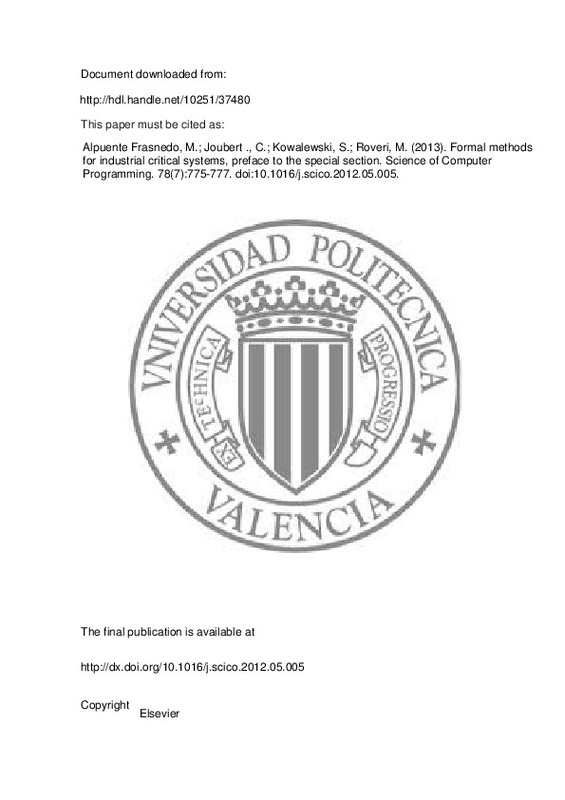|
Resumen:
|
[EN] This special issue contains improved versions of selected papers from the workshops
on Formal Methods for Industrial Critical Systems (FMICS) held in Eindhoven,
The Netherlands, in November 2009 and in Antwerp, ...[+]
[EN] This special issue contains improved versions of selected papers from the workshops
on Formal Methods for Industrial Critical Systems (FMICS) held in Eindhoven,
The Netherlands, in November 2009 and in Antwerp, Belgium, in September
2010. These were, respectively, the 14th and 15th of a series of international
workshops organized by an open working group supported by ERCIM (European
Research Consortium for Informatics and Mathematics) that promotes research in
all aspects of formal methods (see details in http://www.inrialpes.fr/vasy/fmics/).
The FMICS workshops that have produced this special issue considered papers
describing original, previously unpublished research and not simultaneously submitted
for publication elsewhere, and dealing with the following themes:
Design, specification, code generation and testing based on formal methods.
Methods, techniques and tools to support automated analysis, certification,
debugging, learning, optimization and transformation of complex, distributed, real-time and embedded systems.
Verification and validation methods that address shortcomings of existing
methods with respect to their industrial applicability (e.g., scalability and
usability issues).
Tools for the development of formal design descriptions.
Case studies and experience reports on industrial applications of formal
methods, focusing on lessons learned or new research directions.
Impact and costs of the adoption of formal methods.
Application of formal methods in standardization and industrial forums.
The selected papers are the result of several evaluation steps. In response to the
call for papers, FMICS 2009 received 24 papers and FMICS 2010 received 33
papers, with 10 and 14 accepted, respectively, which were published by Springer-
Verlag in the series Lecture Notes in Computer Science (volumes 5825 [1] and
6371 [2]). Each paper was reviewed by at least three anonymous referees which
provided full written evaluations. After the workshops, the authors of 10 papers
were invited to submit extended journal versions to this special issue. These papers
passed two review phases, and finally 7 were accepted to be included in the
journal.
[-]
|
|
Agradecimientos:
|
his work has been partially supported by the EU (FEDER) and the Spanish MEC TIN2010-21062-C02-02 project, MICINN INNCORPORA-PTQ program, and by Generalitat Valenciana, ref. PROMETEO2011/052.
|







![[Cerrado]](/themes/UPV/images/candado.png)


